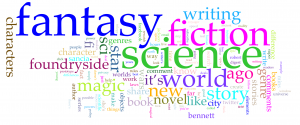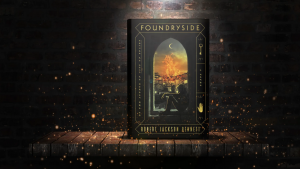Last summer, I read a really good book: Foundryside by Robert Jackson Bennett. I’m a sucker for a good adventure story, and this one definitely got it going. The story takes place in dark and grimy Tevanne, a city described as having elements of an antiquated Italianish city set deep within a fictional tropical jungle. The city is ruled by four trading companies, headquartered in “campos,” who exert extreme political will over the city’s society. It follows Sancia, a cat burglar with the ability to talk to “scrived” objects, ones that have been inscribed with ancient runes that alter their perception of reality. Sancia slowly uncovers a vast conspiracy that will change Tevanne forever.
It was so, so good. Other people thought it was excellent too, and it currently rocks a whopping 4.3 reading on Goodreads. It was so good, I pre-ordered the sequel, Shorefall, which came in the mail last week(!)
Reviewers had a difficult time categorizing this book. Many, like The New York Times, classified it as fantasy. A Barnes & Noble review refers to it more comfortably as science fiction. A Tor review says it’s a mix of both. One reviewer from the Verge, citing Foundryside’s gritty urban atmosphere and human modification theme, classified it as cyberpunk.
In trying to put this strange but wonderful book in a box, it forces one to consider the boundaries and limitations of two similar genres. In spite of their similarities, it is their differences that allow each of them to shine and challenge the status quo in new ways.
I always thought the differences between the two genres fell onto one difference: in sci-fi, the arbiter of the surreal is based on technology, where in fantasy, it’s based on magic. As a result, science fiction typically looks to the future, where such a technology may be possible, and fantasy typically looks to the past, where more wondrous things existed before they were ruined by technology.
Other people cite other elements as defining the limits of the two genres. They cite the mystical setting of fantasy as a defining characteristic of that genre, which I don’t like, because usually that means there has to be elves or dragons and some shit like that to be real fantasy (see: Game of Thrones, Lord of the Rings, Harry Potter, etc.) . Such limits leave out awesome works that are definitely fantasy, like American Gods and His Dark Materials. Other people cite the “hero’s journey” as a trademark of fantasy, but awesome sci-fi works follow the same trajectory (The Matrix, Mad Max).
Honestly, it’s kind of a mess. This line is blurry and confusing and my only conclusion is that if someone says they know the difference, through and through, they’re probably lying.There ought to be a section between the sci-fi and fantasy at Barnes and Noble: call it scifantasy. That’s where Foundryside would lie.
I feel comfortably classifying the Foundryside series as something liminal and transient. Yes, the arbiter of the strange and surreal in the series comes from the world’s technology, but yes, the mechanisms under-girding that technology is unknowable. But, counterpoint: aren’t the mechanisms that make the computer that I’m writing this, or the website to which I’m going to publish this, also as magical and unknowable to me? I could drop out of Bowdoin, go to a state university with an awesome computer science program, potentially get a lucrative job at a dumb tech company (the kind that has Nerf guns in the office and caters lunch and talks about “disrupting industries” and all that stupid shit) and do their dumb internet shit and I STILL probably wouldn’t understand how any of it works fully. So what makes ancient runes that alter reality any stranger than the microchip in my phone?
But it’s a great book.
Other things that blend science fiction with fantasy
- Superman, created by Jerry Siegel and Joe Shuster, 1938-present
- A Wrinkle in Time by Madeleine L’Engle, 1962
- Dune by Frank Herbert, 1965
- Star Wars, created by George Lucas, 1977-2019
- Tron, directed by Steven Lisberger, 1982
- Donnie Darko, directed by Richard Kelly, 2001
- Mortal Engines by Philip Reeve, 2001
- Avatar, directed by James Cameron, 2009
- Pretty much all the Marvel movies in the past ten years
Cirrus Cloud


